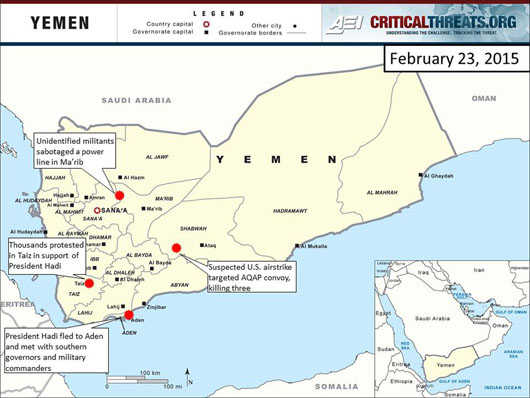Ma’rib tribes joined in the call to establish an alternative capital in Aden and announced their support for the recently resigned Yemeni president, Abdu Rabbu Mansour Hadi. President Hadi fled to Aden this weekend after being held under house arrest by the al Houthis in Sana’a.
Yemen’s recently resigned president fled to Aden and called for the al Houthis to leave the capital. Hadi escaped his house arrest in Sana’a on February 21 and went to Aden. Hadi met with southern governors and military commanders, including the commander of the 4th Military District, in Aden on February 22. Hadi later released a statement under his title as president demanding the al Houthis leave Sana’a and calling for a national dialogue.
Ma’rib tribes joined the call for an alternative capital in Aden. Ma’rib tribes announced their support for Hadi and called for the temporary establishment of a capital in Aden. The tribes rejected dialogue with the al Houthis and urged citizens to take up arms against them. Last week, southern political leaders called for the establishment of an alternative capital in Taiz or Aden. Separately, unidentified militants sabotaged an electric transmission line in al Jada’an, Ma’rib, which is east of Sana’a, on February 22. Local sources denied that the electric line was sabotaged.
Al Houthis reacted to Hadi’s departure from Sana’a by arresting his nephew in Ibb. An official al Houthi spokesperson told reporters that Hadi’s departure did not matter while another al Houthi official stated Hadi’s departure was a “mistake.” The al Houthis reportedly arrested the security guards responsible for guarding Hadi in Sana’a and Hadi’s nephew, Nasser Ahmed Mansour Hadi, in Ibb on February 22.
Al Houthis mandated that former cabinet members join the caretaker government. The al Houthi Supreme Revolutionary Committee demanded that former ministers resume their duties until the formation of a transitional government or be charged with treason. The al Houthis reported that 16 unnamed ministers have agreed to join the caretaker government.
Yemen’s economic situation looks increasingly dire. Yemen’s government continues to borrow heavily from local banks to keep the government afloat despite declining oil revenues. It is unclear how much longer the government will be able to pay civil servant salaries. The International Monetary Fund (IMF) stated that a $553 million loan to Yemen promised in July is still in place, but Yemen needs foreign aid to keep its economy viable.
The U.S. continues its targeted airstrike program. A suspected U.S. airstrike hit a vehicle carrying al Qaeda in the Arabian Peninsula (AQAP) members on February 20 in al Hawta, Shabwah, southern Yemen. Three AQAP militants reportedly died in the attack.
Hadi’s escape to Aden may accelerate calls for autonomy from southern and eastern tribal and military forces, isolating the al Houthis in northern Yemen. AQAP will continue to use instability and anti-al Houthi sentiments to expand its presence in southern and eastern governorates.
← PREVIOUS |
NEXT → |

